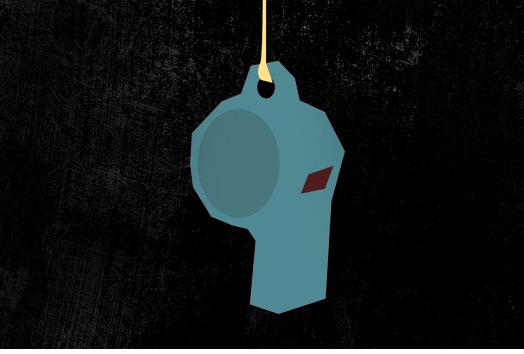FREE FLOW OF INFORMATION
An article by Elizabeth “Liz” Hempowicz, Public Policy Associate, POGO (Project on Government Oversight
Daniel Kaye, the United Nations’ Special Rapporteur for Freedom of Expression, recently submitted a report to the General Assembly on the protection of whistleblowers and sources. The report highlights key elements of protections for whistleblowers, and is based in part on participation by 28 States as well as individuals and non-governmental organizations (NGOs). Among a host of best-practice protections featured in the report, the Special Rapporteur focuses particular attention on national security whistleblowers and sources, those whistleblowers who are often subject to criminal prosecution for exposing serious problems.

Image: Adapted from Jared Rodriquez / Truthout
Notably, the report recommended a public interest balancing test for disclosures in the national security field that could be used to claim protection from retaliation or as a defense when facing prosecution. This balancing test would promote disclosures where the public interest in the information outweighs any identifiable harm to a legitimate national security interest, and requires that the whistleblower disclose no more information than reasonably necessary to expose wrongdoing. A defense for blowing the whistle in the national security field would be a welcome one, as these whistleblowers often face prosecution under the Espionage Act, which could mean years of costly litigation for simply trying to expose practices that make us less secure. This balancing test is similar to one proposed last year by Yochai Benkler, a law professor and co-founder of the Berkman Center for Internet and Society, and supported by the Project On Government Oversight.
The full report contains many best-practice recommendations that our Congress should consider to strengthen whistleblower protections domestically.
(Thank you to Janet Hudgins, the CPNN reporter for this article.)
Free flow of information, How is it important for a culture of peace?
Here is a response to the question from David Adams
Perhaps the simplest way to illustrate the essential importance of free flow of information for a culture of peace is to discuss the importance of the control of information for the culture of war.
Here are excerpts from an Washington Post investigation two years ago entitled Top Secret America: A hidden world, growing beyond control. To read the original, click here.
“* Some 1,271 government organizations and 1,931 private companies work on programs related to counterterrorism, homeland security and intelligence in about 10,000 locations across the United States.
* An estimated 854,000 people, nearly 1.5 times as many people as live in Washington, D.C., hold top-secret security clearances.
* In Washington and the surrounding area, 33 building complexes for top-secret intelligence work are under construction or have been built since September 2001. Together they occupy the equivalent of almost three Pentagons or 22 U.S. Capitol buildings – about 17 million square feet of space.
* Many security and intelligence agencies do the same work, creating redundancy and waste. For example, 51 federal organizations and military commands, operating in 15 U.S. cities, track the flow of money to and from terrorist networks.
* Analysts who make sense of documents and conversations obtained by foreign and domestic spying share their judgment by publishing 50,000 intelligence reports each year – a volume so large that many are routinely ignored.” . . .
“Every day across the United States, 854,000 civil servants, military personnel and private contractors with top-secret security clearances are scanned into offices protected by electromagnetic locks, retinal cameras and fortified walls that eavesdropping equipment cannot penetrate. . .
Much of the information about this mission is classified. That is the reason it is so difficult to gauge the success and identify the problems of Top Secret America, including whether money is being spent wisely. The U.S. intelligence budget is vast, publicly announced last year as $75 billion, 21/2 times the size it was on Sept. 10, 2001. But the figure doesn’t include many military activities or domestic counterterrorism programs.”
As we said in the draft Declaration and Programme of Action on a Culture of Peace that we sent from UNESCO to the UN General Assembly in 1998:
“98. It is vital to promote transparency in governance and economic decision-making and to look into the proliferation of secrecy justified in terms of ‘national security’, ‘financial security’, and ‘economic competitiveness’. The question is to what extent this secrecy is compatible with the access to information necessary for democratic practice and social justice and whether, in some cases, instead of contributing to long-term security, it may conceal information about processes (ecological, financial, military, etc.) which are a potential threat to everyone and which need therefore to be addressed collectively.”